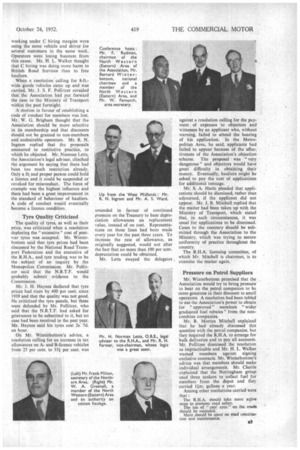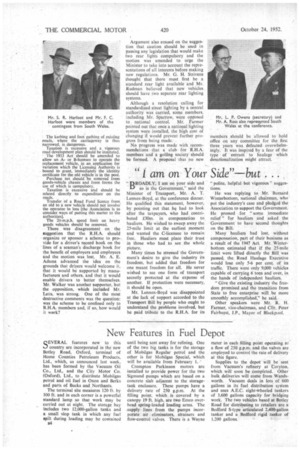Wages Council Still Wanted
Page 36

Page 37

Page 38

If you've noticed an error in this article please click here to report it so we can fix it.
CEVERAL highly controversial pro posals were lost by overwhelming majorities, although the discussion of them was restrained. One of them was that the Road Haulage Wages Council should be abolished and replaced by machinery for collective bargaining.
The case for it, as expressed by Mr. J. M. Horroeks, Mr. H. I. Turner and Mr. F. Rudman, was that national increases of wages were hard on areas where trade had declined and higher wages could not be passed on to customers without the risk of losing traffic and causing unemployment, and that the Road Haulage Wages Act was necessary in 1938, but not to-day.
The opposing arguments, put forward by Mr. C. W. H. Sparrow and Mr. J. H. Male, were that if the industry went back to joint negotiation, there would be unfair competition by wage-cutting and that the repeal of the Act would not benefit either the employers or employees. Mr. Male added that some operators' were still not observing the statutory coriftions, such as holidays with pay.
After Mr. R. H. Farmer had declared, among applause, that the present was the wrong time to advocate new restrictions, a resolution in favour of limiting C hiring to work under contract for one concern for a specified period, was not proceeded with.
„Mr. G. E. Chettle, who proposed the motion, referred to the abuse of the 1933 Act and said that some hauliers working under C hiring margins were using the same vehicle and driver for several customers in the same week. Operators were losing business from this cause. Mr. H. L. Walker thought that C hiring was doing more harm to British Road Services than to free hauliers.
When a resolution calling for &ft.wide goods vehicles came up and was carried, Mr. J. S. F. Poliitzer revealed that the Association had put forward the case to the Ministry of Transport within the past fortnight.
A motion in favour of establishing a code of conduct for members was lost. Mr. W. a Brigham thought that the Association should be more selective in its membership and that discounts ehould not be granted to non-members and undesirable operators. Mr. R. N. Ingram replied that the proposals amounted to restrictive practice, to which he objected. Mr. Norman Letts, the Association's legal adviser, clinched the argument by saying that there had been too much restriction already. Only a fit and proper person could hold a licence and it could be suspended or revoked for misconduct. The force of example was the highest influence and there had been a great improvement in the standard of behaviour of hauliers. A code of conduct would eventually become a licence condition.
Tyre Quality Criticized
'The quality of tyres, as well as their price, was criticized when a resolution deploring the "excessive" cost of postwar tyres was accepted. Mr. Winterbottom said that tyre prices had been discussed by the National Road Transport Federation and the executive of the RI-LA,, and tyre trading was to be the subject of an inquiry by the Monopolies Commission. Mr. Pollitzer said that the N.R.T.F. would probably submit evidence to the Commission.
Mr. J. H. Haynes declared that tyre prices had risen by 400 per cent. since 1939 and that the quality was not good. He criticized the tyre panels, but these were defended by Mr. Pollitzer, who said that the N.R.T.F. had asked for grievances to be submitted to it, but no case had been received in the past year. Mr. Haynes said his tyres cost 2s." 7d. an hour.
On Mr. Winterbottom's advice, a resolution calling for an increase in tax allowances on Aand B-licence vehicles from 25 per cent, to 331 per cent. was amended in favour of continued pressure on the Treasury to base depreciation allowances on replacement value, instead of on cost. Representations on these lines had been made every year for the past three years. To thcrease the rate of allowance, as originally suggested, would not alter the fact that no more than 100 per cent. depreciation could be obtained.
Mr. Letts swayed the delegates , against a resolution calling for the payment of expenses to objectors and witnesses by an applicant who, without warning, failed to attend the hearing of his application. In the Metropolitan Area, he said, applicants had failed to appear because of the effectiveness of the Association's objection scheme. The proposal was "very dangerous" and objectors would have great difficulty in obtaining their money. Eventually, hauliers might be asked to pay the cost of applications for additional tonnage.
Mr. S. A. Hartz pleaded that applications should be dismissed, rather than adjourned, if the applicant did not appear. Mr. J. B. Mitchell replied that the matter had been taken up with the Ministry of Transport, which • stated that, in such circumstances, it was usual for applications to be dismissed. Cases to the contrary should be submitted through the Association to the Ministry, which was trying to secure uniformity of practice throughout the country.
The R.H.A. licensing committee, of which Mr. Mitchell is chairman, is to examine the matter again.
Pressure on Petrol Suppliers
Mr. Winterbottom promised that the Association would try to bring pressure to bear on the petrol companies to be more generous in their discount to small operators. A resolution had been tabled to use the Association's power to obtain for " approved " members "wider graduated fuel rebates" from the noncombine companies.
Mr. R. Morton Mitchell explained that he had already discussed this question with the petrol companies, but they required the R.H.A. to arrange for bulk deliveries and to pay all accounts. Mr. Pollitzer dismissed the resolution as impracticable and Mr. H. L. Walker warned members against signing exclusive contracts. Mr. Winterbottom's advice was that members should make individual arrangements. Mr. Chettle explained that the Nottingham group used three tankers to collect fuel for members from the depot and they carried lim. gallons a year.
Among other resolutions carried were that :
The R.H.A. should take more active steps to promote road safety.
The use of "cats' eyes" on the roads should be extended.
More should be spent on road construction and maintenance.
The kerbing and foot pathing of existing roads, where the carriageway is thus narrowed, is dangerous. Taxation is excessive and a vigorous road development plan should be instituted.
The 1933 Act should be amended to allow an Aor B-licensee to operate the replacement vehicle, in an application for variation which the Licensing Authority is bound to grant, immediately the identity certificate for the old vehicle is in the post. Purchase tax should be removed from goods-vehicle chassis arid from forms the use of which is compulsory. Taxation is excessive and should be related directly to expenditure on the roads.
Transfer of a Road Fund licence from an old to a new vehicle should not involve the operator in loss ltbe Association is to consider ways of putting this matter to the authorities]. The 20-m.p.h. speed limit on heavy goods vehicles should be removed.
There was disagreement on the suggestion that the R.H.A. should organize or sponsor a scheme to provide for a driver's record book on the lines of a seaman's discharge book for the benefit of employers and employees and the motion was lost. Mr. A. E., Adams advanced the idea on the grounds that driyers would welcome it, that it would be supported by manufacturers and others, and that it would enable drivers to better themselves. Mr. Walker was another supporter, but the opposition, which included Mr. Letts, was strong. One of the most destructive comments was the question: was the scheme to be confined only to R.H.A. members and, if so, how would it work? Argument also ensued on the suggestion that caution should be used in passing any legislation that would make two rear lights compulsory and the motion was amended to urge the Minister to take into account the relatesentations of all interests before making new regulations. Mr. G. H. Strivens thought that there must first be a standard rear light available and Mr. Rudman believed that new vehicles should have two separate rear lighting systems.
Although a resolution calling for standardized street lighting by a central authority was carried, some members, including Mr. Sparrow, were opposed to national control. Mr. Farmer pointed out that once a national lighting system were installed, the high .cost of changing if would prevent further progress from being made.
No progress was made with recommendations that a club for R.H.A. members and a golfing society should be formed. A proposal that no new members should be allowed to hold office on any committee for the first three years was defeated overwhelmingly. It was inspired by a fear of the type of entrant to haulage which denationalization might attract.




















































































